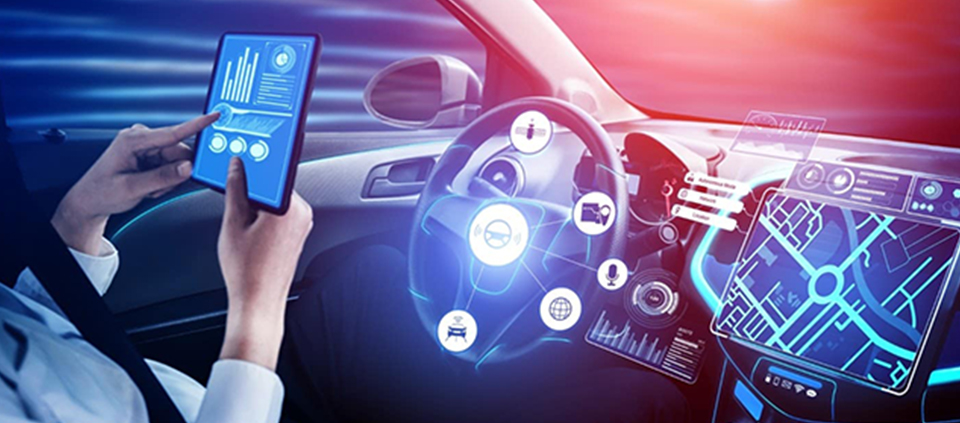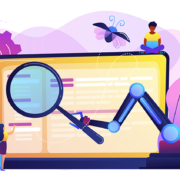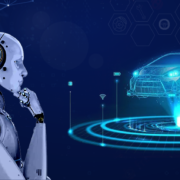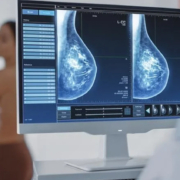There was a time when your car was simply a mechanical conveyance to get you from point A to point B. The automotive “infotainment” industry was born when the first AM car radios became an option on vehicles. Ever since then, entertainment features to enhance the driving experience have become increasingly more sophisticated, and today the future of the automotive infotainment industry is being driven by AI.
From smart sensors to “digital twins” and the promise of fully autonomous vehicles, AI is truly propelling innovation in the auto industry. One area that has certainly seen a significant change with the advent of AI is the car infotainment industry. AI-powered infotainment technologies have revolutionized various aspects of the driving experience, making it more personalized, efficient, and enjoyable.
One of the main advantages of AI in-car infotainment is its ability to create a personalized driving experience. Machine learning algorithms can analyze the driver’s music preferences, climate control settings, and even seat adjustments, automatically adjusting these settings to match the driver’s preferences. This level of personalization allows for a more comfortable and enjoyable driving experience tailored to the individual’s needs.
AI has also enhanced the safety features of cars. AI-powered cameras and sensors can detect signs of drowsiness or distraction in a driver and alert them to take necessary precautions. Additionally, AI systems can analyze data from various sources, such as traffic patterns, weather conditions, and car sensor data, to predict potential accidents and take preventive measures, such as adjusting the car’s speed or alerting the driver to potential hazards.
According to Hideaki Ishii, Managing Director, Pioneer India Electronics, beyond personal comfort and enhanced safety, voice recognition technology has seen significant advancements with the integration of AI into car infotainment systems. “Drivers can now interact with their car’s infotainment system using natural voice commands, allowing hands-free operation and reducing distractions while driving. AI-powered voice recognition systems can understand complex commands and respond accordingly, making it easier for drivers to control various car functions,” says Hideaki.
The marriage of AI and automotive infotainment is only going to expand. Some cars are already equipped with AI-powered virtual assistants that can recommend entertainment options based on the driver’s mood or preferences, creating a more personalized and engaging entertainment experience while on the road.
AI the Auto Industry, BigRio, and CarTwin
AI holds immense promise in-car infotainment. As AI technology continues to evolve, we can expect even more intelligent and personalized features in cars. For example, an AI-powered infotainment system may be able to analyze a driver’s physiological data, such as heart rate and stress levels to determine their mood and then the car can automatically adjust the music and the vehicle’s internal environment to create a calmer and more relaxing driving experience.
As such technology emerges, you can be sure that BigRio and our sister company CarTwin will be a part of it.
Just as there are startups leveraging AI to advance vehicle infotainment systems, there are many other areas where AI is revolutionizing the driving experience, not the least of which is digital twin technology for advanced diagnostics like that being developed and implemented by CarTwin. Digital twin solutions like those developed by CarTwin are taking predictive maintenance to extraordinary levels all across the transportation industry.
Basically, CarTwin can provide diagnostic and predictive models for all vehicle systems for which data is available (either directly or indirectly) onboard the vehicle.
Virtually any part of the vehicle that has sensors or that sensors can be developed for can be “twinned.” These data sets are then enhanced and augmented with design and manufacturing data that is already available by the OEM.
Primarily designed for use in fleets of vehicles, in combination with powerful AI models, CarTwin predicts breakdowns, monitors and improves performance, and measures and records real-time greenhouse gas emissions, which reduces expensive maintenance costs and avoids lost revenue associated with fleet downtime.
It is very likely in the not-too-distant future, as fully autonomous vehicles replace human-driven fleets of over-road cargo transportation and taxis and limousine services that technology such as CarTwin’s will also be incorporated into the algorithms to keep these vehicles not only self-driving but safe and on the road longer.
You can read much more about how AI and digital twin technology in my new book Quantum Care: A Deep Dive into AI for Health Delivery and Research. While the book’s primary focus is on healthcare delivery, it also takes a deep dive into digital twin tech, with an entire chapter devoted to CDT and the development and launch of CarTwin!
Rohit Mahajan is a Managing Partner at BigRio and the President and Co-Founder of Citadel Discovery. He has particular expertise in the development and design of innovative AI and machine learning solutions for clients in Healthcare, Financial Services, Retail, Automotive, Manufacturing, and other industry segments.
CarTwin has leveraged AI and Digital Twin technologies to create a digital, cloud-based clone of a physical vehicle designed to detect, prevent, predict, and optimize through AI and real-time analytics. If you would like to benefit from our expertise in these areas or if you have further questions on the content of this article, please do not hesitate to contact us.









